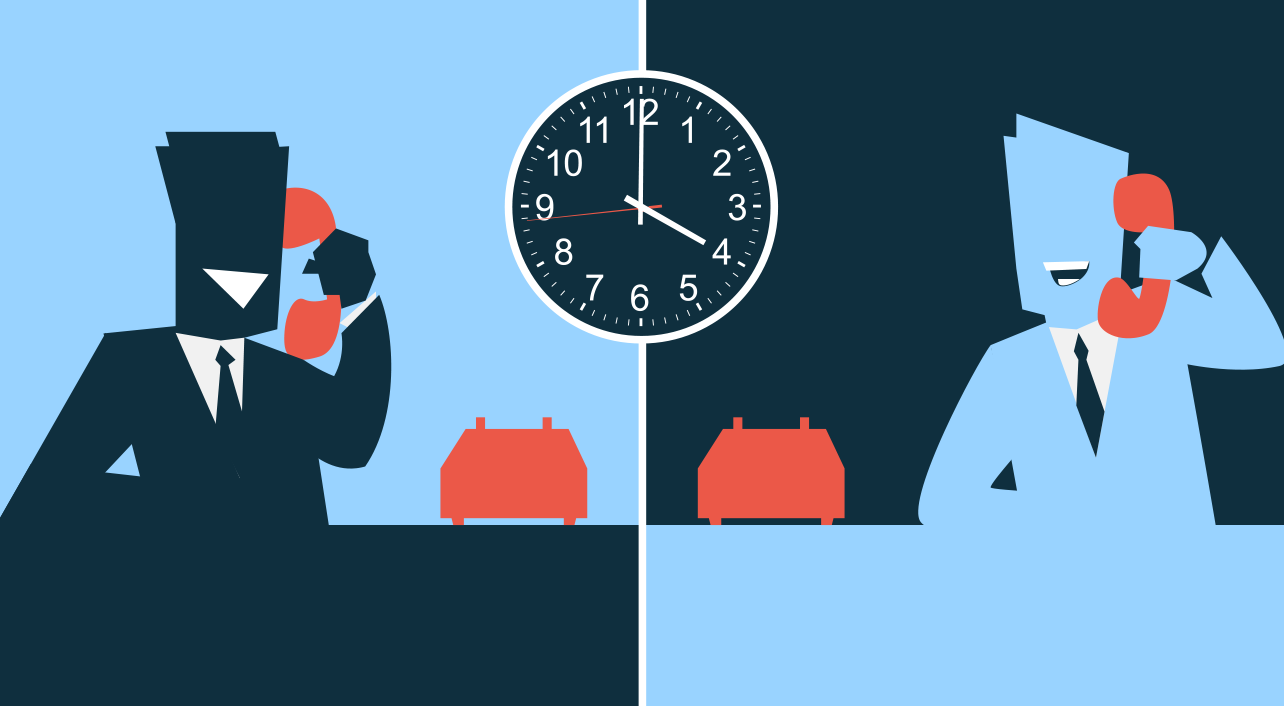- sales
- Blog post
On the clock: The best, and worst, times to try to close
It’s Monday morning. You call a customer who you think is ready to close a deal you’ve been working on for weeks. He says he’s too busy right now. “Call me on Tuesday at 4,” he says.
Should you say:
- Four sounds great. I’ll call you then.
- Or: I can’t do 4 on Tuesday. How about 10 a.m. on Wednesday?
- Or: I can’t do 4 on Tuesday. How about an hour earlier, at 3?
Think carefully before you answer. The wrong choice could reduce your odds of getting the sale by a factor of seven. We’ll reveal the right answer later on.
When to wait
So when is the best time to close a sale?
Conventional wisdom says: the sooner the better. Waiting only gives the buyer a chance to reconsider, come up with new objections, or even talk to your competitor.
It’s true that if your prospect is ready to buy, you shouldn’t wait. But what about situations like the one in our example? You’re not going to close that sale on the spot. So when’s the best time to schedule the meeting or conversation that will get you the sale?
Timing can play a huge role in how that interaction goes and whether the buyer will say yes or no. In fact, one study found the odds of getting agreement could increase from 10% to 70%, simply due to time of day.
At first glance, this study seems to have nothing to do with sales. But the implications for salespeople are significant.
Time of day’s impact
Scholars from Columbia University and Israel’s Ben Gurion University analyzed more than 1,100 decisions of an Israeli parole board. They wanted to see what factors swayed board members to grant or deny a prisoner’s request for parole.
Surprisingly, these decisions didn’t seem to depend on anything about the prisoners – not the nature of the crime, the severity of their sentence or anything else specific to their case.
Rather, the researchers found, the parole decisions seemed to be linked to when each person’s hearing was held. Prisoners who appeared early in the morning were paroled 70% of the time. Those who appeared late in the day got paroled at a rate of less than 10%.
What was going on here?
Sure, the board members were tired after a long day of hearing appeals. Did their fatigue make them less sympathetic to the inmates, or more concerned about public safety, or worried about public backlash?
‘Ego depletion’ at work
It was none of those things, the researchers concluded. They were simply less inclined to make any decision that upset the status quo.
Decision making is hard work. In the morning, when the parole board members were fresh, they had the mental energy to work through the complicated question of whether an inmate deserved parole.
Later in the day, they suffered from what the researchers called “ego depletion”: they didn’t have the mental resources to dig into these tough issues. But they were still expected to render a decision. So they defaulted to the status quo — keep the prisoners locked up – because it was easier.
The board members didn’t realize what was driving their decisions. They honestly believed that they were judging each case on its merits and rendering fair judgments. But the statistics said otherwise.
The easy status quo
So what does this study have to do with sales?
When you ask for a sale, you’re usually asking the buyer to make a change from the status quo. When a buyer’s ego is depleted, the easiest thing is to just leave things as they are. Buying is an active decision, and, as the study shows, decision making is hard work. So you want buyers to make that decision when they have the mental energy to do it right.
Which brings us back to our initial scenario: When your buyer suggests talking at 4 on Thursday, should you agree or try to change the time?
You’d probably be better off meeting the next morning.
Low-energy times
Most buyers will be depleted near the end of their workday. Other low-energy times often occur just before lunch, or before breaks, the researchers found. A few people will buck the trend: They’re at a low ebb in the morning and get a burst of energy in the afternoon. You have to know your buyer.
The main idea is that if you ask buyers to make a decision when their ego is depleted, they’re more likely to stick with the status quo. If you want them to make a change, get to them when they have the mental energy to give the decision the attention it deserves.
This blog entry is adapted from the Rapid Learning module “Closing Time: When’s it best to ask for the sale?” If you’re a Rapid Learning customer, you can watch the video here. If you’re not, but would like to see this video (or any of our other programs), request a demo and we’ll get you access.
The blog post and Rapid Learning video module are based on the following scholarly article: Danziger, S. et al. (2011) Extraneous factors in judicial decisions. Proceedings of the National Academy of Sciences, 108 (17) 6889-6892.


